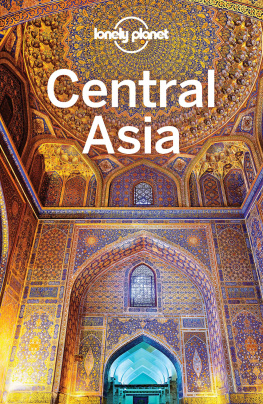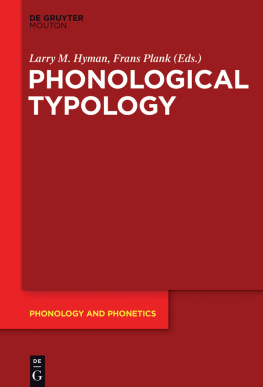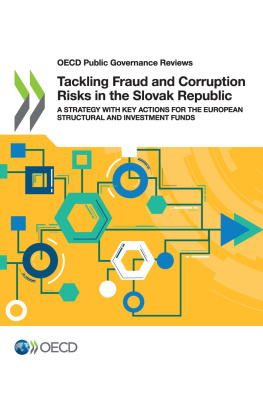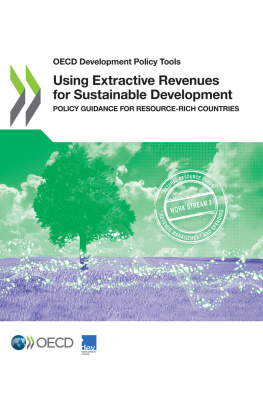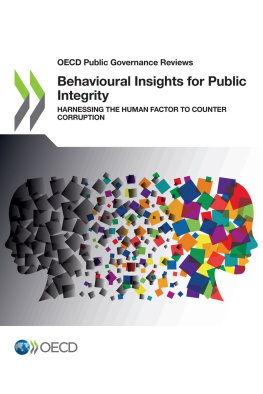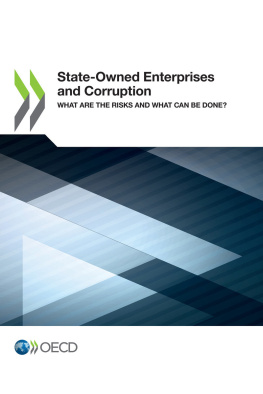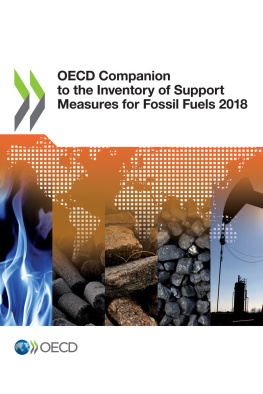coll. - Corruption in the extractive value chain typology of risks, mitigation measures and incentives
Here you can read online coll. - Corruption in the extractive value chain typology of risks, mitigation measures and incentives full text of the book (entire story) in english for free. Download pdf and epub, get meaning, cover and reviews about this ebook. year: 2016, genre: Politics. Description of the work, (preface) as well as reviews are available. Best literature library LitArk.com created for fans of good reading and offers a wide selection of genres:
Romance novel
Science fiction
Adventure
Detective
Science
History
Home and family
Prose
Art
Politics
Computer
Non-fiction
Religion
Business
Children
Humor
Choose a favorite category and find really read worthwhile books. Enjoy immersion in the world of imagination, feel the emotions of the characters or learn something new for yourself, make an fascinating discovery.

Corruption in the extractive value chain typology of risks, mitigation measures and incentives: summary, description and annotation
We offer to read an annotation, description, summary or preface (depends on what the author of the book "Corruption in the extractive value chain typology of risks, mitigation measures and incentives" wrote himself). If you haven't found the necessary information about the book — write in the comments, we will try to find it.
Corruption in the extractive value chain typology of risks, mitigation measures and incentives — read online for free the complete book (whole text) full work
Below is the text of the book, divided by pages. System saving the place of the last page read, allows you to conveniently read the book "Corruption in the extractive value chain typology of risks, mitigation measures and incentives" online for free, without having to search again every time where you left off. Put a bookmark, and you can go to the page where you finished reading at any time.
Font size:
Interval:
Bookmark:
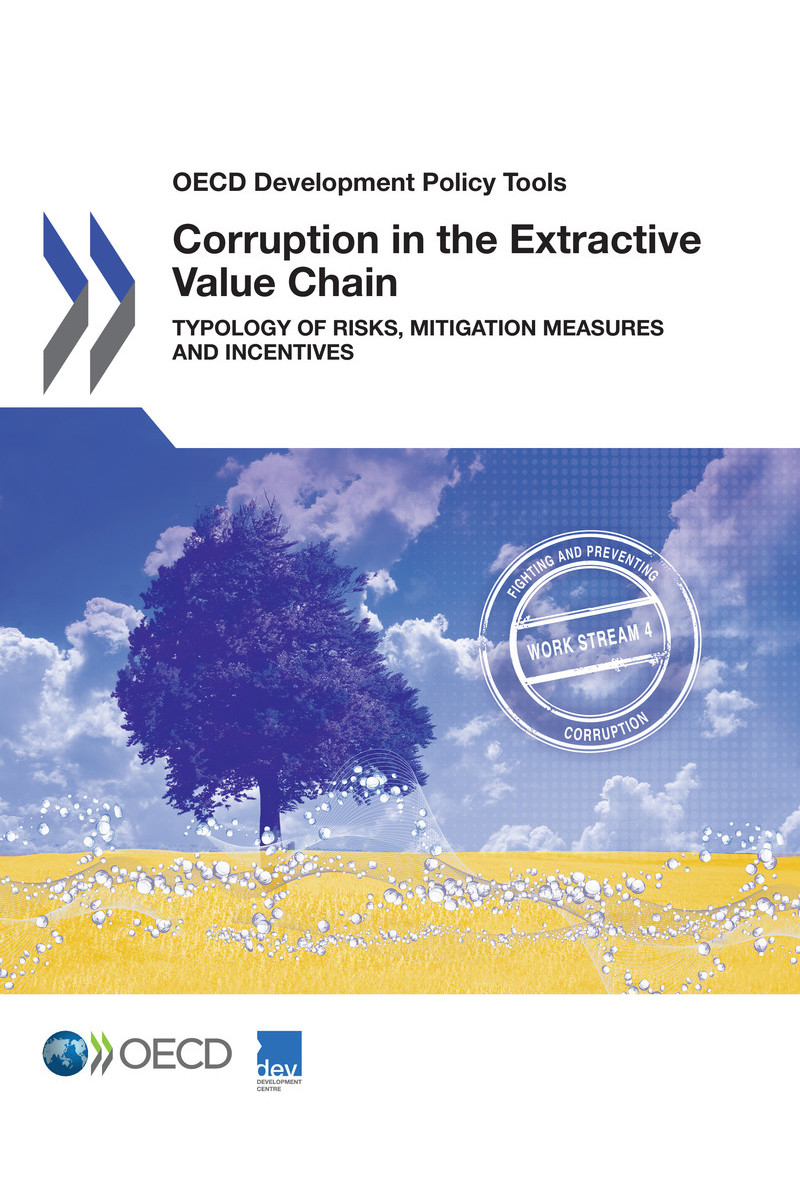
Flicitations et merci davoir tlcharg lun de nos tout nouveaux ePub en version bta.
Nous exprimentons ce nouveau format pour nos publications. En effet, mme si lePub est formidable pour des livres composs de texte linaire, le lecteur peut tre confront quelques dysfonctionnements avec les publications comportant des tableaux et des graphiques tout dpend du type de support de lecture que vous utilisez.
Afin de profiter dune exprience de lecture optimale, nous vous recommandons :
- Dutiliser la dernire version du systme dexploitation de votre support de lecture.
- De lire en orientation portrait.
- De rduire la taille de caractres si les tableaux en grand format sont difficiles lire.
Comme ce format est encore en version bta, nous aimerions recevoir vos impressions et remarques sur votre exprience de lecture, bonne ou autre, pour que nous puissions lamliorer lavenir. Dans votre message, merci de bien vouloir nous indiquer prcisment quel appareil et quel systme dexploitation vous avez utilis ainsi que le titre de la publication concerne. Vous pouvez adresser vos remarques ladresse suivante :
Merci !
Congratulations and thank-you for downloading one of our brand-new ePub-in-beta editions.
We're experimenting with this new format and, while ePub is fantastic for books with linear text, for books with charts, tables and graphs weve found some things may not work perfectly it depends on the device youre using.
So, for an optimal reading experience, we recommend:
- Using the latest version of your devices operating system.
- Reading in portrait mode.
- If large tables are tricky to read, try reducing the text size.
As this is an ePub-in-beta edition, we would be glad to receive feedback on your reading experience, good or otherwise, so we can improve for the future. When writing, please let us know which device/operating system you were using and the title of the publication. Write to:
Thank you!
OECD (2016), Corruption in the Extractive Value Chain: Typology of Risks, Mitigation Measures and Incentives, OECD Development Policy Tools, OECD Publishing, Paris, http://dx.doi.org/10.1787/9789264256569-en.

The complex and specific corruption challenges related to the extraction and trade of natural resources and the management of its associated revenue flows are a source of growing concern across developing, emerging and developed countries. As a result, corruption in the extractive industries has been included in the Action Plans of the G20 Anti-Corruption Working Group. Recognising the need to step-up anti-corruption efforts, world leaders gathered at the Anti-Corruption Summit in May 2016 and explicitly identified the extractive industries as being among the sectors that are particularly vulnerable to corruption, undermining economic growth, threatening security and harming the poor.
For resource rich countries, corruption poses a major threat to development. The high rents generated by resource exploitation and the gate-keeping function performed by governments, combined with discretionary powers, limited competition among key economic players and an often blurred distinction between private and public interests, are among the factors that increase the exposure of the extractive sector to corruption. The adverse impacts on the public interest are huge. Corruption undermines trust in public institutions, disrupts sector effectiveness, reduces the level of revenue collected from resource production and distorts decisions on budgetary allocations.
The increasing global competition for access to natural resources coupled with the resource-seeking nature of foreign direct investment can also further exacerbate corruption risks and create perverse incentives for extractive companies. The proceeds from corruption often fuel transnational crime and illicit financial flows, and are facilitated by complex corporate structures, opaque financial transactions and off-shore centres.
Tackling the cross-border aspects of corruption in the extractive sector is vital. Focusing only on large multinationals, or only on host governments would fall short of achieving meaningful results. For example, the governing elite often rely upon resource rents to gain or maintain power, patronage and privilege. In these cases, supporting governmental reform and transparency and promoting the adoption of anti-corruption measures is important. However, relying exclusively on government action to effectively tackle corruption is illusory in situations where resource rents are the primary means for exercising and perpetuating political influence. Both the supply and the demand sides need to be addressed, at domestic and international levels, and between private and public actors.
Given these challenges associated with extractives governance, the OECD has developed, as part of its Initiative for Policy Dialogue on Natural Resource-based Development, Corruption in the Extractive Value Chain: Typology of Risks, Mitigation Measures and Incentives. This study provides, for the first time, a systematic mapping of corruption risks at each stage of the value chain. Designed through a multi-stakeholder process, the Typology makes an important contribution towards building a common knowledge base on how corruption works and better informing evidence-based policy design and action.
Font size:
Interval:
Bookmark:
Similar books «Corruption in the extractive value chain typology of risks, mitigation measures and incentives»
Look at similar books to Corruption in the extractive value chain typology of risks, mitigation measures and incentives. We have selected literature similar in name and meaning in the hope of providing readers with more options to find new, interesting, not yet read works.
Discussion, reviews of the book Corruption in the extractive value chain typology of risks, mitigation measures and incentives and just readers' own opinions. Leave your comments, write what you think about the work, its meaning or the main characters. Specify what exactly you liked and what you didn't like, and why you think so.



